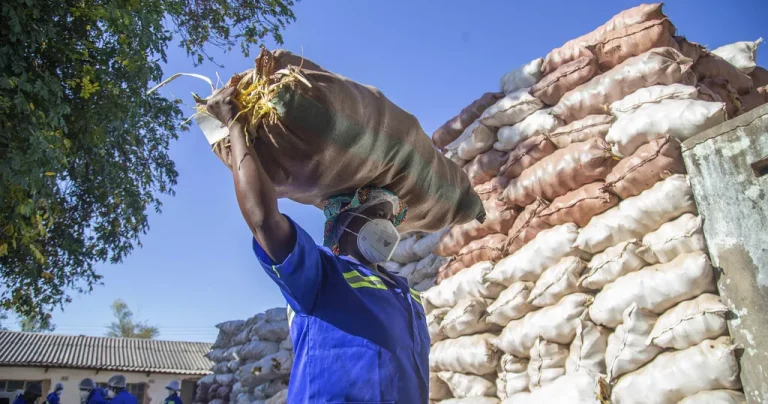

1024x538 cmsv2 2fd85966 e6cc 5db3 b2b9 5e844ece092e 8740642 (1)
Loveness Bhitoni has been picking baobab fruit from the gigantic trees surrounding his farm in Zimbabwe since childhood, to vary his family’s diet based on maize and millet.
Droughts caused by climate change have decimated his staple crops. Meanwhile, the world is increasingly interested in the baobab as a natural food.
Every day, Bhitoni rises before dawn to forage for baobab fruit, walking barefoot through hot, thorny landscapes at the risk of being attacked by wild animals. She picks bags of hard-shelled fruit from the hundred-year-old trees and sells them at low prices to industrial processors or their intermediaries. The baobab is no longer a simple spice. It’s a means of survival.
The worldwide market for baobab products has grown rapidly in recent years, transforming rural African areas where the trees are abundant into vital supply markets. Baobab trees need more than 20 years to start producing fruit, and thousands of people like Bhitoni have emerged to meet this need. According to Zimtrade, a government export agency, Zimbabwe has around 5 million trees.
The USA legalized the import of baobab powder as a food and beverage ingredient in 2009, a year after the European Union. Along with China, they now represent the main markets for baobab powder.
Residents like Bhitoni receive little else for their work in collecting baobab fruit. According to them, they can only dream of being able to afford the commercial products that the fruit becomes.
Bhitoni says that some middlemen are taking advantage of drought-induced hunger to offer maize flour in exchange for seven 20-liter buckets of crushed fruit.
The growing industry can be seen at a processing plant in Zimbabwe, where baobab pulp is bagged separately from the seeds for various uses. Away from the factory, the hard shells are transformed into biochar, an ash given freely to farmers to make organic compost and improve soil fertility.
Here, Bhitoni says she can spend up to eight hours a day walking long distances across the sun-scorched savannah. She’s exhausted the nearby trees.
According to Prosper Chitambara, a development economist based in Zimbabwe’s capital Harare, this difficult situation is likely to continue due to the lack of bargaining power of the fruit pickers, some of whom are children.
Government export agency Zimtrade deplored the low prices paid to baobab pickers and said it was considering partnering with rural women to set up processing plants.
Moving from one baobab to the next, Bhitoni carefully examines each fruit before leaving the smallest to wild animals such as baboons and elephants, thus perpetuating an ancestral tradition in the fast-changing world of the baobab.
The Gujarat Titans (GT) team confirmed Thursday that fast bowler Kagiso Rabada is taking an early IPL 2025 exit to…
The International Finance Corporation gives Raxio Group $100 million to accelerate their data center building efforts throughout Sub-Saharan African regions.…
The Oklahoma City Thunder secured their tenth consecutive victory by beating the Chicago Bulls 145-117. This victory raised their season…
The Board of Control for Cricket in India introduced a detailed list of cricket matches that will take place at…
Rob Walter Resigns his Position as coach for the Proteas men's team for white-ball games because personal problems needed attention.…
Starting April 2, South African drivers will get lower costs when filling their tanks as fuel prices decrease for all…
This website uses cookies.